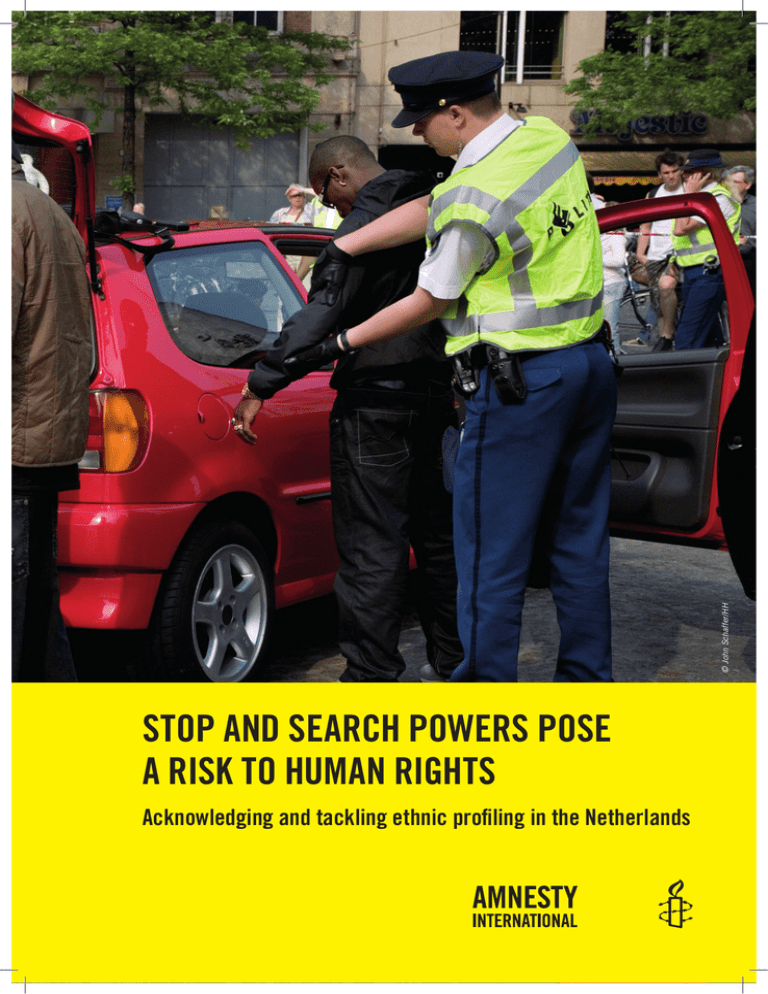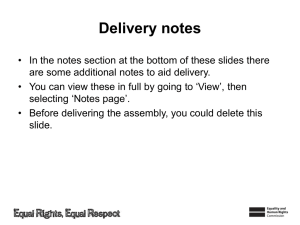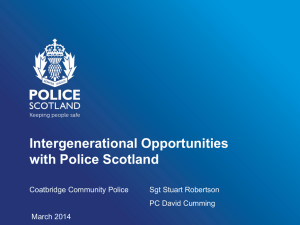
© John Schaffer/HH
STOP AND SEARCH POWERS POSE
A RISK TO HUMAN RIGHTS
Acknowledging and tackling ethnic profiling in the Netherlands
1
STOP AND SEARCH POWERS POSE
A RISK TO HUMAN RIGHTS
Acknowledging and tackling ethnic profiling in the Netherlands
INTRODUCTION
In October 2013, the Dutch section of Amnesty International published a report on ethnic profiling in the
Netherlands: Stop and search powers pose a risk to human rights. Acknowledging and tackling ethnic profiling
in the Netherlands.
This is an English summary of the conclusions and recommendations of the report.
The full report (in Dutch) can be downloaded at:
http://www.amnesty.nl/nieuwsportaal/rapport/nederland-proactief-politieoptreden-vormt-risico-voormensenrechten-in-nederla
With this report, Amnesty International seeks to contribute to the debate on respect for human rights in
the exercise of stop and search powers and on measures to counter ethnic profiling in the Netherlands. The
report focuses mainly on ethnic profiling in the use of stop and search powers: that is, the exercise of powers
arising from the police’s general supervisory powers, in which members of the public may be stopped or
checked without being suspected of any criminal offence. In particular, the report examines the human rights
safeguards against ethnic profiling in the implementation of the Compulsory Identification (Extended Scope)
Act, the Road Traffic Act, preventive body searches (preventief fouilleren) and immigration control (checks for
illegal stay).
In the view of Amnesty International, the practice of ethnic profiling in the Netherlands goes beyond the
level of isolated incidents. Amnesty has analysed and put together existing studies of the implementation
of police duties, policy on security and safety and discrimination, and concludes that ethnic profiling takes
place. In addition, diverse experts and international human rights bodies, including the Human Rights
Committee of the United Nations and the European Commission against Racism and Intolerance (ECRI),
have expressed their concern about ethnic profiling in the Netherlands in recent years. They have called on
the Dutch government to make more strenuous efforts to suppress ethnic profiling, inter alia by monitoring
the way police duties are carried out. To date, however, the Dutch government has paid little heed to these
recommendations.
The report contains recommendations for safeguarding human rights more effectively in proactive police work
such as the exercise of stop and search powers. These recommendations to the Dutch government and police
are based to a large extent on the recommendations issued by the ECRI and the European Union Agency for
Fundamental Rights, and on studies and initiatives on tackling ethnic profiling. Amnesty International calls on
the Dutch government and police to:
•
acknowledge the existence of ethnic profiling and to reject this practice;
•
make a more determined effort to prevent ethnic profiling; and to
•
improve monitoring of the way proactive police duties are carried out.
2
WHAT IS ETHNIC PROFILING AND WHAT ARE ITS CONSEQUENCES? Amnesty International Netherlands defines ethnic profiling as ‘the use by the police, without any objective
justification, of criteria or considerations relating to race, colour, ethnicity, nationality, language or religion
in investigative work and law enforcement, whether at operational or organisational level‘. The principles of
equality and non-discrimination, as enshrined in international, European and national law, provide a clear
basis for defining ethnic profiling as a form of discrimination.
Ethnic profiling manifests itself explicitly when police officers discuss migrants or certain ethnic minorities in
terms of negative stereotypes, or when police officers openly cite someone’s colour or ethnic origin as a reason
for stopping or checking him or her. However, ethnic profiling is often based on unconscious assumptions or
common stereotypes relating to certain ethnic minorities.
Ethnic profiling may also take the form of indirect discrimination. This is when a provision, measure or mode
of conduct that appears neutral on the surface puts certain ethnic minorities at a particular disadvantage
without there being any objective justification for it.
The consequence of ethnic profiling is that ethnic minorities are subjected disproportionately often to stop
and search checks by the police, without there being any reasonable suspicion of guilt or individualised
evidence prompting the check. Ethnic profiling is a form of discrimination that contributes to stigmatisation
and serves to reinforce negative views of ethnic minorities. Ethnic profiling damages the legitimacy of
the police, besides which studies carried out in other countries have shown that it does not enhance the
effectiveness of police work in the fight against crime.
WHY THE CONCERN ABOUT ETHNIC PROFILING?
There is nothing new about ethnic profiling; nor is it a specifically Dutch practice. However, a range of social
and political developments have deepened concerns about the practice of ethnic profiling in the Netherlands.
The political and social climate has changed since the 1990s; attitudes to the position of ethnic minorities
in Dutch society have shifted. There is less reluctance than in the past to express generalisations linking
migration and ethnic minorities to crime and security issues. These changes in the social and political debate
influence the way the police force performs its duties.
Certain developments in policy on security and public safety have also heightened concerns about the
existence of ethnic profiling. In particular, the expansion of the discretionary powers of the police, the trend
towards an ‘intelligence-led police’ and the policy priority of reinforcing the public’s safety perception. The
risk of ethnic profiling is particularly acute when the police has wide-ranging discretionary powers: when
police officers are given a substantial degree of freedom in deciding when to stop or check people, without
having any reasonable suspicion of a criminal offence. The discretionary powers of the Dutch police have been
expanded considerably since the 1990s. This is in part a consequence of the introduction of preventive body
searches (preventief fouilleren) in 2002, the introduction of the Compulsory Identification (Extended Scope)
Act in 2005, and the growing priority in policy on security and safety accorded to a proactive approach to
maintaining public order, most notably as related to ‘youth nuisance’ problems.
Dutch antidiscrimination policy does not accord specific priority either to tackling racial discrimination or to
combating any possible discrimination on the part of the police. This makes it difficult in general to raise the
issue of ethnic profiling. The importance of acknowledging and combating discrimination by the police is laid
3
down in several of the police’s own policy documents. In policy, measures and training courses on diversity
and ways of approaching it, the subject of ethnic profiling is raised obliquely and rarely addressed explicitly.
THE EXPLICIT ACKNOWLEDGMENT AND DISCUSSION OF ETHNIC PROFILING AS PART OF POLICE TRAINING
It is acknowledged within the Dutch police that basing the use of stop and search powers on the professional
intuition of police officers is problematic. There is also recognition for the importance of suppressing
discrimination by the police, and initiatives around the subject of diversity and multicultural expertise are
being developed.
The following steps are recommended:
•
The fact that ethnic profiling takes place should be acknowledged explicitly;
•
More emphatic attention should be paid to the subject of ethnic profiling in the training of police
officers. This should include discussions of the conscious or unconscious effects of thinking in terms of
stereotypes, indirect discrimination, and the pitfalls of ‘professional intuition’.
ETHNIC PROFILING TAKES PLACE: FURTHER INVESTIGATION IS NEEDED
Little research has been done to date in the Netherlands on the ways in which police officers decide who to stop
and check during proactive checks. A research carried out within the Amsterdam-Amstelland of the selection
mechanisms used by police officers was the first study of proactive police actions to deal explicitly with the
considerations that play a role in the minds of police officers when they are deciding who to stop and check.
It emerged from this study that police officers base these decisions on profiles of ‘suspicious citizens’. These
profiles are based to a large extent on characteristics such as age, colour, and ethnic origin. The study concluded
that these stereotypes are dominant within the police force concerned. The result is that young men (more
so than women) from ethnic minorities are subjected to more frequent checks than others. The police force
management team at that time stated that it would take the study’s conclusions and recommendations seriously
and announced measures to tackle the problem.
Several studies have been carried out on proactive law enforcement by the police in response to ‘youth
nuisance’. Although these studies do not focus specifically on the selection of those subjected to checks, they
do reveal that police officers frequently harbour stereotypes and prejudices regarding ethnic minorities that
influence the chosen style of policing and decisions on which young people to stop and check. These studies
do not in general contain assessments of the scale on which prejudices of this kind are present and influence
police actions, but they do contain evidence that ethnic profiling takes place.
Ethnic profiling calls for a combined research approach
To gain a clear picture of the incidence of ethnic profiling, a combined research approach is needed.
This means a combination of: targeted research on police actions (consisting, for instance, of observation
research and in-depth interviews with police officers), research on experiences of discrimination, analyses of
complaints alleging discrimination by the police, and an analysis of quantitative data on police checks.
More quantitative data on stop and search checks
To gain a clear picture of whether certain measures and powers have a disproportionate impact on ethnic
4
minorities, quantitative data are needed on the total number of occasions on which the police stop or check
individuals, including cases that do not culminate in official reports or arrests. However, scarcely any statistics
of this kind are available in the Netherlands: there is no systematic registration of the numbers of checks
carried out on the basis of the Compulsory Identification (Extended Scope) Act, the Road Traffic Act or the
Aliens Act. As for quantitative data regarding the persons subjected to checks, broken down by colour, age
and sex, such data are not available at all.
The introduction of ‘stop forms’
Studies conducted in other countries show that the use of ‘stop forms’ can be a useful instrument in
identifying and dealing with ethnic profiling. In the stop form, police officers register facts such as the reason
and statutory basis for the control, as well as the results, and relevant personal details of the person checked
are registered, such as colour and ethnic origin. The use of stop forms can influence police officers, for
instance to weigh carefully a decision to check someone. Aggregated data can shed more light on the question
of whether ethnic minorities are being subjected to police checks more frequently than others.
The use of stop forms can also help to enhance the effectiveness of police work from the vantage point of crime
prevention. Studies conducted in other countries show that basing police checks on ethnic profiles does not lead
to higher ‘hit rates’: that is, the percentage of police checks that leads to an arrest or evidence that someone has
broken the law. In contrast, such studies show that the use of stop forms can lead to higher ‘hit rates’.
Further investigations of experiences of discrimination
Questionnaires focusing on experiences of discrimination show that a large proportion of individuals from
ethnic minorities in the Netherlands have the impression that they have been stopped or checked by the
police because of their colour and ethnic origin. It has emerged from qualitative studies that young people
from ethnic minorities frequently experience discrimination by the police in proactive responses to ‘youth
nuisance’. Ethnic minority youths have the impression that the police discriminate against them and that they
are subjected to more frequent checks than their white Dutch peers.
Conducting research on people’s experience of discrimination is important in gaining a better understanding
of ethnic profiling. Studies facilitated by the government on experiences of policy on safety and security and
police conduct, such as the Security Monitor, have thus far yielded only limited information on the different
experiences that may exist between different sections of the population.
Analyses of complaints and the registration of discrimination
Mechanisms exist in the Netherlands for submitting complaints on discrimination by the police. Every year,
antidiscrimination services and police complaints commissions receive several hundred complaints about
police discrimination. These constitute evidence for the existence of ethnic profiling. However, a targeted
analysis of registered complaints could provide more insight into the nature and possible patterns of ethnic
profiling. Ensuring the proper registration of complaints and reports of discrimination is therefore key to
efforts to identify and tackle ethnic profiling.
The following steps are recommended:
•
Quantitative data should be collected on the number of people checked by the police, broken down by
colour, age and ethnic origin.
•
5
A pilot experiment should be conducted with the use of ‘stop forms’.
•
A perception study should be carried out on the public’s experience of police actions, distinguishing
between the experiences of white Dutch persons and members of ethnic minorities. This may reveal
differences in experiences of police actions, and hence provide more insight into the extent and
patterns of ethnic profiling.
•
In the government-facilitated reports on complaints and registered incidents of discrimination, such
as the reports issued by police complaints committees and the police’s own registration of incidents
involving discrimination (the Poldis Report), it should be made clear how many of the complaints and
registered incidents of discrimination relate to the police.
PROACTIVE POLICE WORK: STRONGER SAFEGUARDS AND GOVERNMENT MONITORING
This report dwells specifically on the implementation of the Compulsory Identification (Extended Scope)
Act, the Road Traffic Act, preventive body searches, and immigration control (checks for illegal stay). Police
officers have ample scope for exercising their own discretion in applying these powers and in deciding
which individuals they wish to stop or check, without the presence of any reasonable suspicion of guilt.
The discussion of the use of these four proactive powers of inspection have focused on shortcomings in
the statutory safeguards and guidelines, and in the government’s monitoring of implementation. These are
inadequate for the purpose of preventing ethnic profiling.
The following steps are recommended:
•
The circumstances in which police officers are entitled to use discretionary powers should be described
with the utmost clarity. The use of characteristics such as race, colour, and ethnic origin should be
explicitly prohibited or defined with the greatest possible clarity.
•
There should be better government monitoring of the way proactive stop and search powers are used.
This should include a specific, targeted investigation to discover whether ethnic profiling takes place,
and if so to what extent.
MOTIVATING ID CHECKS
With the introduction of the Compulsory Identification (Extended Scope) Act (WUID) in 2005, police officers acquired far greater powers to perform ID checks. The WUID gave police officers the power to ask to see someone’s ID
if this is ‘reasonably considered necessary for the performance of police duties’. The absence of any systematic registration of the way these powers are used, combined with the broad definition of these powers, increases the risk
of arbitrariness and the discriminatory use of powers. Government monitoring of the implementation of the WUID
does not contain any targeted analysis of the occurrence of ethnic profiling. The government-facilitated studies of
the implementation of the WUID have been limited in scope: they do not include any perception research on experiences of discrimination, nor do they contain a quantitative analysis of the question of whether members of ethnic
minorities are subjected to ID checks more frequently than others. Nonetheless, these studies do provide evidence
that ethnic profiling takes place. They do not include any analyses of this phenomenon, however.
6
The following steps are recommended:
•
It should be made obligatory for police officers to register their reasons for asking to see someone’s ID,
including cases in which those concerned respond to the request and are able to show their ID.
•
The guidelines for using the power to ask to see people’s ID should be clarified, inter alia in the context
of proactive police responses to ‘youth nuisance’.
•
Government monitoring of the implementation of the WUID should be improved by carrying out a
targeted analysis of the incidence of ethnic profiling. A pilot experiment with the use of ‘stop forms’
would be useful in this regard.
CLARIFICATION OF THE ROAD TRAFFIC ACT GUIDELINES
Under the terms of the Road Traffic Act, the police can check vehicles in the interests of road safety, for
instance when a traffic violation has been observed or a vehicle displays some visible defect. However, it has
become increasingly common for the powers of the police to perform checks on the basis of the Road Traffic
Act to be used for the purposes of investigation, sometimes in relation to persons who are not suspected of
having committed any criminal offence, or without any individualised evidence prompting the check. To date,
there has been no government monitoring of this application of powers under the Road Traffic Act.
The following steps are recommended:
•
The guidelines for the use of powers conferred by the Road Traffic Act for investigative purposes should be
clarified, so as to reduce the risk of the arbitrary and discriminatory application of these powers.
•
Government monitoring should be carried out of the use of powers conferred by the Road Traffic Act for
investigative purposes, including a targeted analysis of the incidence of ethnic profiling. In this respect
too, an experiment with the use of ‘stop forms’ could make a useful contribution.
GUIDELINES FOR NON-SELECTIVE PREVENTIVE BODY SEARCHES
Within ‘security risk areas’, designated as such in advance for a specified period of time, members of the
public can be subjected to a body search without being suspected of a criminal offence. The legal safeguards
put in place to prevent ethnic profiling in this context are meagre. The statutory principle is that the police
carry out such searches ‘without discrimination’. Guidelines and instructions on how ‘non-selective preventive
body searches’ should be operationalised are largely absent, however. In practice, police officers do in fact
work selectively, and have considerable discretionary powers in deciding which persons to search. In addition,
a practice has grown up of selective and ‘intelligence-led’ preventive body searches based on selection criteria
drawn up in advance.
Government-facilitated studies of the way preventive searches are carried out in practice do not contain any
targeted analysis of ethnic profiling. These studies do contain evidence that this practice exists, but they fail
to subject this evidence to any analytical discussion.
7
The following steps are recommended:
•
Clearer guidelines and instructions should be drawn up for the way powers to conduct non-selective
preventive body searches should be applied in practice.
•
When selection criteria are applied in preventive body searches, it must be ensured that these do not
constitute indirect discrimination.
•
Targeted research should be carried out on the occurrence of ethnic profiling in the practice of preventive
body searches. Government monitoring of this practice should also focus on the possible occurrence of
indirect discrimination, most notably in the light of the practice that has arisen of carrying out preventive
body searches selectively, and the desire to do so as expressed by municipal authorities and the police.
MONITORING IMMIGRATION CONTROL PRACTICES
Under the terms of the Aliens Act, the police have the power to check individuals’ residence status if they
have an objectively justified ‘reasonable suspicion of illegal stay’. The Aliens Act thus has a certain built-in
safeguard to prevent ethnic profiling. Irregular migrants can also be stopped, however, on the basis of powers
that are unrelated to aliens law; in such cases, there are fewer safeguards in place to prevent ethnic profiling.
The basic principle is that immigration control should be carried out with the ‘minimum inconvenience to
third parties’. In other words, it must be avoided, as far as is possible, that people who are lawfully resident in
the Netherlands are checked for suspected illegal stay. Since there is no systematic registration of the number
of police checks that are carried out, it cannot be verified to what extent these checks actually keep to the
principle of causing ‘minimum inconvenience to third parties’. In consequence, it is not known how many
people who are lawfully resident in the Netherlands are checked for illegal stay.
In the context of analysing immigration control, Amnesty International analysed the ‘Kennemerland
bus project’ (the detailed findings are enclosed as a supplement to the report). From 2009 to 2011,
Kennemerland police observed ‘women with a Negroid appearance’ who travelled by bus from Amsterdam to
the Kennemerland region. Aliens police officers waited for the women at Haarlem station and followed the
buses in a covert operation. They suspected that the women were irregular migrants who were working illegally
as domestic workers. The Council of State eventually ruled that this use of the power to stop and check
individuals was unlawful. There is no evidence that the ‘bus project’ is typical of the way in which immigration
control is carried out in the Netherlands. However, this case does shed light on ethnic profiling processes, and
illustrates a number of concerns about its occurrence in the context van checks for illegal stay.
The Dutch government has not commissioned an evaluation of immigration control since 2004. The
findings of this report clearly demonstrate the need for strong government monitoring of current practices in
immigration control.
The following steps are recommended:
•
Government monitoring procedures should be carried out that will shed light on the following: (1) How
many people who are lawfully resident in the Netherlands are subjected to checks on the suspicion
of illegal stay (whether under the terms of the Aliens Act or on the basis of powers unrelated to
aliens law); (2) The use of powers unrelated to aliens law for checks for illegal stay, in particular the
8
Compulsory Identification (Extended Scope) Act and the Road Traffic Act. A pilot experiment with
‘stop forms’ could shed light on the extent to which this takes place.
•
The guidelines for the application of an objectively justified reasonable suspicion of illegal stay should
be clarified, to prevent people being checked for illegal stay wholly or partly on the grounds of their
colour or ethnicity.
•
The guidelines for the way in which police units and police officers are expected to implement a
number of the policy priorities laid down in policy on irregular migrants should be clarified. These
policy priorities include that of stopping irregular migrants who are responsible for criminal offences or
causing a public nuisance.
9
© John Schaffer/HH
AMNESTY INTERNATIONAL
Dutch Section
PO Box 1968
1000 BZ Amsterdam
The Netherlands
T (0031) (0)20-6264436
F (0031) (0)20-6240889
E amnesty@amnesty.nl
I www.amnesty.nl
© Amnesty International april 2014








